
If the coronavirus pandemic has taught us anything, it’s that the United States is overly dependent on other nations — especially China — when it comes to vital pharmaceutical supplies. On Monday, the Trump administration made a bold move to address that issue by signing a $354 million contract with an American pharmaceutical company to create the nation’s first strategic stockpile of key ingredients to make vital medications.
Phlow Corporation, a generic drug manufacturer based in Richmond, Virginia, has been awarded a contract to manufacture pharmaceutical ingredients, chemical compounds, and generic drugs, some of which can be used to treat hospital patients who are suffering from the COVID-19 virus.
The contract was awarded by the Biomedical Advanced Research and Development Authority (BARDA) and could be extended to 10 years at a cost of $812 million, which would make it the largest contract ever awarded by BARDA.
Going forward, Phlow will manufacture drugs in cooperation with non-profit pharmaceutical company Civica Rx, Virginia Commonwealth University, and AMPAC Fine Chemicals, a manufacturer of active pharmaceutical ingredients.
“We’re talking about critical medicines that are used to place patients on the ventilator. They are medicines such as key antibiotics as well as medicines for pain management,” said Dr. Eric Edwards, the CEO and co-founder of Phlow Corp.
According to Edwards, the contract was being discussed with the Trump organization as early as last November but became fast-tracked when COVID-19 hit.
“We have a short-term and a long-term solution. We know that there are certain key essential generic medicines that are going to go into shortage if this thing starts spreading,” Edwards said.
Phlow has already produced 1.6 million doses of five drugs essential in treating COVID-19 and added them to the nation’s strategic stockpile.
“Long before COVID-19 existed, there were many drugs already on the FDA drug shortage list. We’re talking about 100 medicines and many of these were essential medicines critical for maintaining the life of Americans,” Edwards said.
Phlow Corporation had been warning of this problem long before COVID-19 hit. According to their website, roughly 80 percent of active pharmaceutical ingredients are currently produced overseas. This action looks to bring back the manufacture of those ingredients back to the United States.
“The United States’ drug supply chain is broken, becoming dangerously dependent on foreign suppliers for our most essential generic medicines,” the company’s website explains.
“Manufacturing of these essential drugs has migrated to China and India over time,” said Dr. Frank Gupton, another co-founder of Phlow Corp. “I think that the COVID-19 epidemic has kind of shone a light on this gap that we’ve got right now and the ability to produce our own drugs.”
The White House called the move “historic.”
“This is an historic turning point in America’s efforts to onshore its pharmaceutical production and supply chains,” said Peter Navarro, the president’s top trade advisor. Navarro said that the new project “will not only help bring our essential medicines home but actually do so in a way that is cost competitive with the sweatshops and pollution havens of the world.”
The new deal looks to address a long-term problem in the healthcare industry, which has only become more acute during the coronavirus crisis: Getting the necessary drugs needed to maintain an adequate supply. Such procurement often involves teams of people calling wholesalers, distributors, and manufacturers and still coming up short on supply.
“It’s like an auction,” said Arash Dabestani, director of the pharmacy at NYU Langone Health in New York. “Whoever screams the loudest gets it.”
Sounds like a rather rickety system for securing the nation’s drug supply. But Gupton believes that this new contract signals a new and better way of securing those vital supplies and bringing drug manufacturing back to the United States.
“We believe this work can revolutionize America’s drug manufacturing model by enabling Phlow to produce affordable ingredients used to manufacture essential medicines in the U.S.”
As Edwards explains, it’s critical for the nation to plan ahead, not only for coronavirus, but for other unexpected events in the future.
“When there is a trade dispute or a natural disaster or a pandemic that creates a vulnerability in the supply of one or more drugs, as soon as we see that vulnerability begin to manifest itself, Phlow Corporation will pull that active ingredient out and we’ll work with our conversion partners, such as Civica, to make the finished dosage form, then get into the Strategic National Stockpile,” Edwards said.
“I cannot emphasize enough how vulnerable our supply chain is and how critical some of these drugs are in shortage.”
In this increasingly uncertain world, it’s only prudent for America to have its own supply of essential drugs.
Image: LaylaBird/iStock/Getty Images Plus
James Murphy is a freelance journalist who writes on a variety of subjects, with a primary focus on the ongoing anthropogenic climate-change hoax and cultural issues. He can be reached a [email protected].




